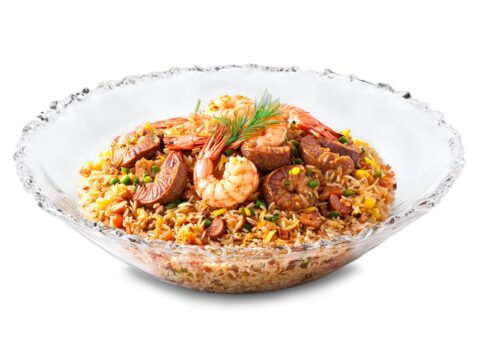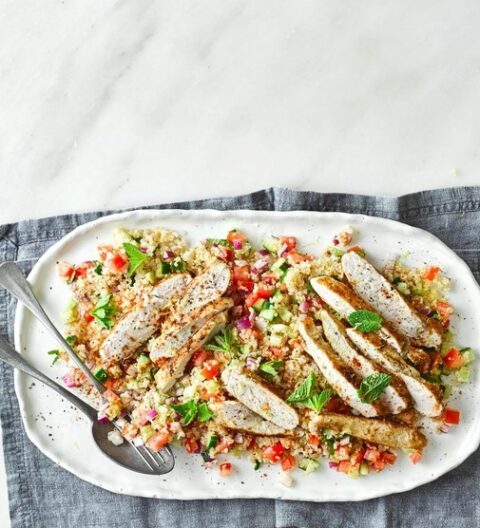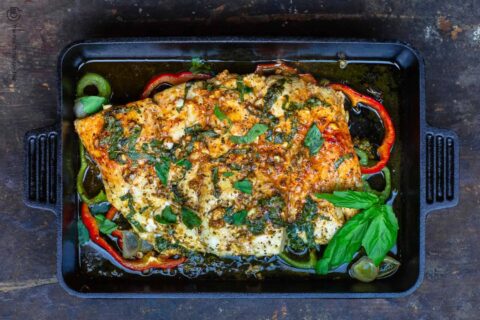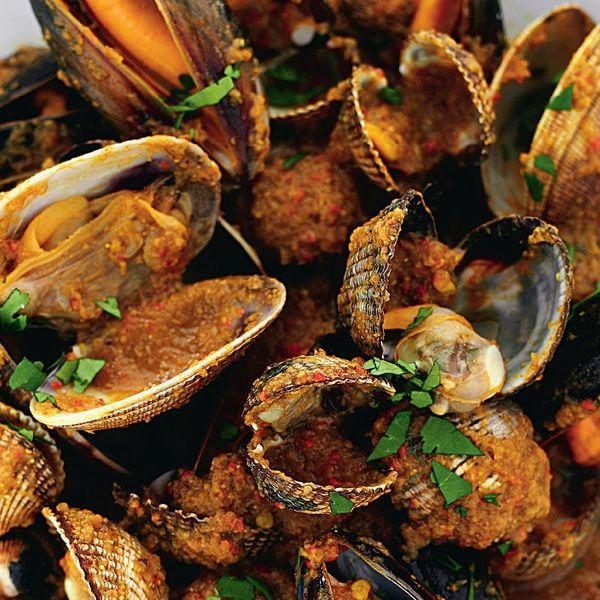
Another Of Morocco Gold’s Healthy Food Recipes Using The Best Extra Virgin Olive Oil
Updated July 16th 2023
Using Your Morocco Gold Within A Healthy Mediterranean Diet Recipe
Extra virgin olive oil is not only one of the best-tasting oils in the world, but it is also among the healthiest. It’s no wonder that many consider it the best olive oil out there. The reason is that it is packed with polyphenols – organic compounds that are known for their antioxidant properties and their ability to lower inflammation in the body.
When consumed as part of a healthy diet, in particular the Mediterranean diet, extra virgin olive oil can contribute to a healthy lifestyle by supporting heart health, regulating blood sugar levels, and reducing the risk of certain cancers. Additionally, olive oil benefits extend to brain health, skin health, and weight management, making it a versatile and nutritious food to include in your diet. So, the next time you are preparing your favourite dish use it and know that you are not only enjoying its delicious flavor, but also contributing towards a healthier and happier life. Here is a great combination to try.
Why Morocco Gold Extra Virgin Olive Oil, Cockles & Clams Make Such A Great Combination.
Shellfish has been consumed as food by man for thousands of years now. Today they are a part of every cuisine in every part of the world, especially those places which are located near the coastal areas. Shellfish include crustaceans such as crabs, lobsters, and shrimps; echinoderms such as sea urchins and sea cucumbers; and mollusks such as oysters, scallops, mussels, clams, and cockles.
As anyone who has ever cooked with olive oil knows, not all olive oils are created equal. The best olive oil is cold-pressed and extra virgin olive oil, Morocco Gold. Why is extra virgin olive oil the best? Because it is made from pure, cold-pressed olives, without the use of chemicals or heat. This preserves the natural antioxidants and polyphenols that are so beneficial to our health. In addition, Extra virgin olive oil has a higher smoke point than other types of olive oil, making it ideal for cooking.
So what makes cockles and clams such a healthy recipe match with Morocco Gold extra virgin olive oil? For one thing, they are both packed with nutrients. Cockles are rich in protein and iron, while clams are an excellent source of vitamin B12. But more importantly, when cooked together with Morocco Gold extra virgin olive oil, they create a dish that is bursting with flavour and healthy fats. The combination of succulent seafood and rich, flavourful olive oil is truly irresistible. And best of all, it’s good for you!
Ingredients
- 1¾kg (4lb) mixed live mussels, cockles and small clams, cleaned
- 2 tbsp extra virgin olive oil
- 2 tbsp roughly chopped coriander
Masala Paste
- 1 tbsp coriander seeds
- 1 tsp cloves
- 2 tbsp cumin seeds
- 2 onions, quartered
- 8 large garlic cloves
- 50g (2oz) fresh ginger, chopped
- A walnut-sized piece of seedless tamarind pulp
- 1 tsp ground turmeric
- 3 medium-hot red chillies, chopped
- 2 tbsp red wine vinegar
- 40g (1½oz) creamed coconut
Instructions
- For the masala paste, heat a dry heavy-based frying pan over a medium-high heat.
- Add the coriander seeds, cloves and cumin seeds and cook until they darken slightly and start to smell aromatic.
- Tip into a spice grinder and grind to a powder. Put this mixture and all the other paste ingredients into a food processor and blend until smooth.
- Heat the extra virgin olive oil in a large pan, add the masala paste and fry for a few minutes until it starts to separate from the oil.
- Add the mussels, cockles and clams, cover and cook over a high heat for 3-4 minutes, shaking the pan now and then, until they have all opened.
- Add a little water if there is not quite enough sauce, season with a little salt if necessary, then add the chopped coriander.
- Mix the mussel, cockle and clam shellfish soup together and spoon into warmed bowls and serve.
About Clams
Clams are marine or freshwater bivalves. The shells of which are composed of two equal sections that are joined together. It is a term used to refer to all bivalve mollusks, and it is also used to refer to those bivalves which burrow into sediment. They usually live in the sand or mud, and they breathe through siphons. They have no head and no eyes, but they are equipped with kidneys, a mouth, an anus, a heart, and an open circulatory system.
Clams come in different shapes and sizes with most of them edible although not all are fit to be consumed. There are two types of clams, namely; the hard-shell clams and soft-shell clams. Some of the hard-shelled clams are: little neck clams, cherry clams, Manila clams, and the chowder clams.
Some of the soft-shelled clams are: steamer clams, razor clams, and the geoduck clams. These soft-shelled clams are so called, not because their shells are soft, but because their shells are thin and brittle. They have a stronger flavor and smell and are best cooked slowly. They typically taste sweet. That’s why they are best eaten raw, but they can also be cooked and used as ingredients for soups and in other recipes.
About Cockles
Cockles, on the other hand, are small, edible, marine bivalves. They live in sandy beaches, and their shells are symmetrically round which appear heart shaped when viewed from the ends. Like clams and other mollusks, they also burrow and live in the sand and feed on plankton. Preparing them for cooking entails thorough washing to remove the sand, and they have to be cooked before they can be consumed, though, because raw cockles have been known to cause hepatitis. They are prepared through boiling, frying, or pickling.
There are several types of cockles such as the common cockle, or the Cerastoderma edule, the dog cockle which is inedible, the blood cockle which is common in Korea and Malaysia, and the true cockle which is also known as the egg cockle.
About Mussels
Mussels are nature’s freshwater version of marine clams. Technically, a freshwater mussel is a bivalved molluskthat lives in fresh water. They are also referred to as freshwater clams, naiadsand unionids (the scientific name for the group to which most mussels belong). These amazing animals are essentially living water filters, moving as much as eight gallons of water per day through their internal filtration systems. Considering that freshwater mussels can filter out dangerous bacteria such as E. coli, their important role in keeping water clean cannot be underestimated.
Mussels are an under-appreciated wonder food. Full of vitamins and minerals, high in protein and low in fat. It is a wonder these culinary stars are not more of a staple in healthy diets. However, with more information about the health benefits of mussels than ever before, this is starting to change. Top nutritionists and fitness professionals have started to explore how the simple mussel boosts physical health.
Health Benefits of Clams
Clams are packed with nutrients, and they are especially high in iron and vitamin B12. In fact, clams contain more vitamin B12 than almost any other food. Clams offer a good amount of omega-3 fatty acids as well as moderate amounts of vitamin C. Clams have a better protein density than almost any other food. They are one of the best dietary sources of choline and are rich in iodine and selenium.
Health Benefits Of Cockles
Cockles are low in calories, with 79 calories in a 100-gram serving. This amount is less than 4 percent of the average intake of 2,000 calories and is lower in calories than other types of seafood. Cockles can be a good choice if you are trying to lose weight.
Cockles are rich in protein, with 13.5 grams in each 100-gram serving. Consuming protein is vital for your health, as it provides the structure for your body’s cells and tissues.
Cockles, as with many other types of seafood, are low in carbohydrates. Each serving of cockles provides 4.7 grams of carbohydrates, with no fibre and no sugar. Carbohydrates supply your body with energy for exercise, so if you are a competitive athlete, you may wish to eat a carbohydrate-rich side dish along with cockles.
Cockles are low in fat, with just 0.7 grams in each 100-gram serving. None of the fat in cockles is saturated fat, a type of fat that may increase your risk of heart disease. Some fat is beneficial for your health, as it helps your body absorb nutrients and can supply energy for extended exercise bouts.
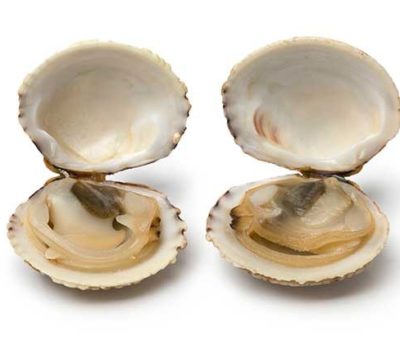
Health Benefits Of Mussels
Mussels are high in protein and low in fat. This is great news for anyone on a calorie restricted diet, as it shows it’s possible to enjoy exciting meals that are healthy without sacrificing flavour. There is no need for fat, as steaming or boiling with a few herbs or white wine is the best way to prepare a tasty mussel dish.
For those who enjoy a high-protein intake, mussels offer a welcome break from steak. Not only are they better for the environment (as they are ecologically friendly and easy to farm) they also offer levels of protein and iron that rival that of red meat. An increase in protein and iron intake boosts mood, energy levels, and even complexion. A fantastic outcome from introducing mussels to your weekly diet!
The heart benefits from a reduction in the risk of heart attack due to those all-important Omega-3 fatty acids. Omega-3s are vital, and have all sorts of health benefits that should not be overlooked.
Mussels are one of the most well-rounded foods to include in your diet, high in zinc, iron and other minerals, vitamins A and B12. A fantastic source of protein, low in calories and low in fat. Prepared in a classic moules marinière or in a more adventurous Thai curry, or simply steamed. No matter how they are eaten, rest assured they are a delicious and healthy choice
Mussel, Cockel & Clams Masla With Extra Virgin Olive Oil
With all of these exceptional health benefits to enjoy from these three little beauties, which one to choose? Well, why not enjoy them all in this seafood curry recipe with mussels, cockles and clams as the stars and of course Morocco Gold extra virgin olive oil.

